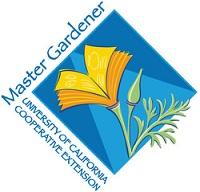
University of California
UC Master Gardener Program of Sonoma County
Mulch
Of the many different types of materials that can be used to cover the ground, only one benefits both the soil and the gardener—a mulch derived from plants. As organic materials slowly break down into compost over time, they assist gardeners by reducing time spent on weeding, but more critically, they slow evaporation, moderate soil temperatures, prevent erosion, and gradually improve soil quality and fertility. The continuous supply of compost feeds soil organisms, key to converting nutrients into forms plants are able to absorb. Food plants, ornamental perennials, shrubs, and trees—all benefit from a continuous renewal of layers of mulch.
Weed Control
- Mulch acts as a barrier to weed germination from untold numbers of seeds on the soil surface.
- Mulch prevents soil disturbance that enhances weed growth.
- Mulch blocks any competition from weeds for a plant’s access to water, sun, and nutrients.
- Mulch makes it easy to pull weeds that grow from air-borne seeds landing on its surface.
Enriched Soil
- Plant-based mulches slowly break down into compost at the soil surface and begin there to improve soil structure. Burrowing worms and beneficial insects move compost to lower levels reducing soil compactness.
- Compost binds soil particles into tiny, granular clumps creating pore space, critical for air and water penetration into the root zone.
- Earthworms are attracted to upper soil levels under the protection of mulch. They perform initial steps in breaking down organic materials that eventually feed soil microorganisms.
- A healthy earthworm population adds nutrient-rich castings (excretions) that eliminate most needs for supplemental fertilizers.
Moisture Conservation
- Organic mulch reduces evaporation even as it allows water to move into the soil.
- Soil moisture fluctuates less under mulch, maintaining a constant, though diminished, water source for plant roots during periods of heat and drought.
- Soil covered with mulch requires less frequent irrigation than bare ground.
Moderated Soil Temperatures
- A thick layer of insulating mulch maintains cooler underground temperatures than ambient air during heat spells that can kill essential soil microbes.
- Shallow roots are protected from burning summer sun when mulch covers the ground.
- Underground heat is lost slowly under mulch when severe frosts threaten to damage roots.
Erosion Prevention/Water Absorption
- Mulch stops rain droplets from washing away topsoil and moving silt into waterways.
- Mulch stops winds from blowing loose surface particles away as dust.
- Mulch allows water to penetrate and enter the soil under either thick or thin porous layers, whereas bare ground sheds water easily.
Types of Mulch and Mulch Application
May 2022







